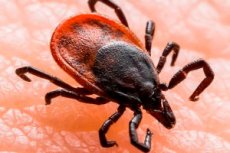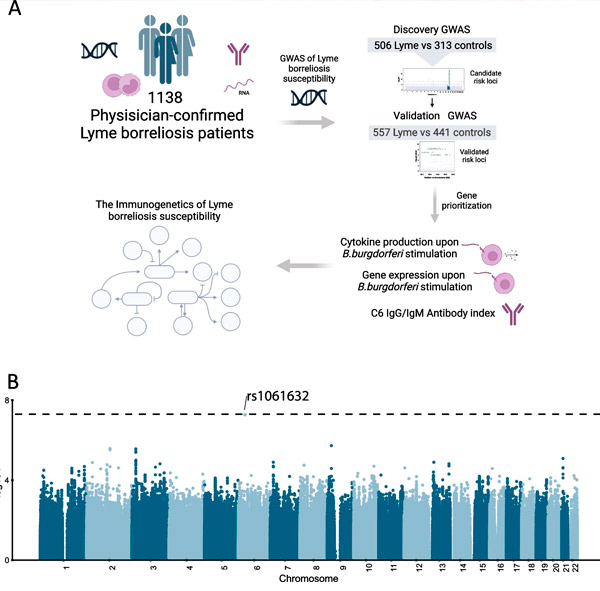
莱姆病是德国最常见的蜱传疾病。目前尚不清楚某种遗传易感性是否在该疾病的发展中发挥作用,以及该疾病与人体的哪些免疫过程有关。
个体化感染医学中心 (CiiM) 是亥姆霍兹感染研究中心 (HZI) 和汉诺威医学院 (MHH) 的联合机构,其研究团队与荷兰拉德堡德大学医院和阿姆斯特丹大学医学中心合作,现已发现导致该病的遗传变异和所涉及的免疫参数。
如果蜱虫感染了伯氏疏螺旋体(Borrelia burgdorferi sl,即广义上的伯氏疏螺旋体),这些细菌就会通过蜱虫叮咬传播给人类并引发疾病。各种器官都可能受到影响:皮肤、神经系统或关节。
“伯氏疏螺旋体感染并不总是会导致疾病,就莱姆病而言,通常可以用抗生素成功治疗。然而,正如我们的合作伙伴所发现的,一些受影响的个体尽管接受了抗生素治疗,但仍会出现持续性症状,例如疲劳、认知障碍或疼痛,”CiiM 主任兼 HZI 个性化医疗生物信息学部门负责人 Yang Lee 教授说道。
“为了找到未来开发治疗莱姆病的有效疗法的更多起点,更好地了解导致该疾病发展的遗传和免疫机制非常重要。”
为此,研究团队分析了1000多名莱姆病患者的基因模式,并将其与未感染者的基因模式进行了比较。“我们的目标是识别与该疾病直接相关的特定基因变异,”CiiM研究员、两项研究的共同第一作者之一Javier Botey-Bataller解释说。
“我们实际上已经在莱姆病患者中发现了一种特定的、以前未知的基因变异。”

Rs1061632 变异与乳腺炎易感性相关。队列概览。1107 份乳腺炎患者 DNA 样本可用于质量检查和估算,最终形成一个发现队列(n = 506)和一个验证队列(n = 557)。B 曼哈顿图显示了发现队列中与乳腺炎易感性相关的全基因组显著变异。来源:BMC Infectious Diseases (2024)。DOI:10.1186/s12879-024-09217-z
研究小组进行了各种细胞生物学和免疫学测试,以找出这种遗传倾向会带来哪些具体的生理后果。
“一方面,我们能够证明,这种基因变异的存在会导致体内抗炎过程减弱。这意味着莱姆病的炎症和症状可能会持续更长时间,”李解释说。
研究人员还发现,具有这种基因变异的患者体内针对伯氏疏螺旋体的抗体水平显著降低,这表明患者无法有效地攻击这种细菌,从而使病情持续时间更长。
“我们还能够识别出 34 个不同的基因位点,这些基因位点通过细胞因子等介质参与调节莱姆病患者的免疫反应,并且可能在其他免疫介导疾病(如过敏)中发挥重要作用,”Boteil-Bataille 说。
在这项研究中,人类基因组中的所有基因都被记录在所谓的基因图谱中。每个基因都有其独特的位置,称为基因位点。“我们的研究结果清楚地表明了免疫反应是如何由遗传决定的,”李说。
“由于我们的研究结果基于庞大的群体而形成的极其广泛的数据库,因此它们为进一步的研究方法提供了极好的基础,例如研究所涉及基因的不同变体对莱姆病严重程度的影响。”
近年来,北半球莱姆病的发病率有所上升。研究小组表示,即使气候变化,未来莱姆病的发病率仍可能进一步上升。这是因为通常情况下,较温和的气温可以延长蜱虫的繁殖季节,并扩大其活动范围。
结果是蜱虫叮咬增多,从而导致莱姆病病例增多。“我们的研究结果为理解莱姆病的遗传和免疫过程提供了重要见解。我们希望为开发针对长期症状的莱姆病患者的有效治疗方法铺平道路,”李说道。

